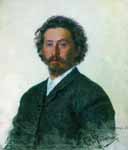Ilya Repin

Ilya Yefimovich Repin (Russian: Илья́ Ефи́мович Ре́пин; 5 August [O.S. 24 July] 1844 – 29 September 1930) was a Russianrealist painter. He was the most renowned Russian artist of the 19th century, when his position in the world of art was comparable to that of Leo Tolstoy in literature. He played a major role in bringing Russian art into the mainstream of European culture. His major works include Barge Haulers on the Volga (1873), Religious Procession in Kursk Province (1883) and Reply of the Zaporozhian Cossacks (1880–91).
Repin was born in Chuguyev, in the Kharkov Governorate (now Ukraine) of the Russian Empire into a military family. He entered military school in 1854 and in 1856 studied under Ivan Bunakov, a local icon painter. He began to paint around 1860. He met fellow artist Ivan Kramskoi and the critic Vladimir Stasov during the 1860s, and his wife, Vera Shevtsova in 1872 (they remained married for ten years). In 1874–1876 he showed at the Salon in Paris and at the exhibitions of the Itinerants' Society in Saint Petersburg. He was awarded the title of academician in 1876.
In 1880 Repin traveled to Zaporozhia in Ukraine[citation needed] to gather material for the 1891 Reply of the Zaporozhian Cossacks. His Religious Procession in Kursk Province was exhibited in 1883, and Ivan the Terrible and His Son Ivan in 1885. In 1892 he published the Letters on Artcollection of essays. He taught at the Higher Art School attached to the Academy of Arts from 1894. In 1898 he purchased an estate, the Penates, in Kuokkala, Finland (now Repino, Saint Petersburg).
In 1901 he was awarded the Legion of Honour. In 1911 he traveled with his common-law wife Natalia Nordman to the World Exhibition in Italy, where his painting 17 October 1905 and his portraits were displayed in their own separate room. In 1916 Repin worked on his book of reminiscences, Far and Near, with the assistance of Korney Chukovsky. He welcomed the Russian Revolution of 1917. Celebrations were held in 1924 in Kuokkala to mark Repin's 80th birthday, followed by an exhibition of his works in Moscow. In 1925 a jubilee exhibition of his works was held in the Russian Museum in Leningrad. Repin died in 1930 and was buried at the Penates.
